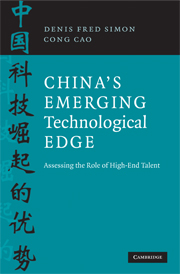Book contents
- Frontmatter
- Contents
- List of Figures and tables
- Acknowledgements
- Abbreviations
- Introduction
- 1 Human resources, technological innovation, and economic growth
- 2 China's talent challenge
- 3 Human resources in science and technology, and their structure and characteristics in China
- 4 Higher education and scientists and engineers in the pipeline
- 5 Utilization of scientists and engineers in China
- 6 “Brain drain,” “brain gain,” and “brain circulation”
- 7 Supply and demand of science and technology talent in China: key drivers
- 8 China's talent in key emerging technologies
- 9 Whither China's talent pool?
- Appendix: Understanding Chinese science and technology human resources statistics
- References
- Index
1 - Human resources, technological innovation, and economic growth
Published online by Cambridge University Press: 25 January 2011
- Frontmatter
- Contents
- List of Figures and tables
- Acknowledgements
- Abbreviations
- Introduction
- 1 Human resources, technological innovation, and economic growth
- 2 China's talent challenge
- 3 Human resources in science and technology, and their structure and characteristics in China
- 4 Higher education and scientists and engineers in the pipeline
- 5 Utilization of scientists and engineers in China
- 6 “Brain drain,” “brain gain,” and “brain circulation”
- 7 Supply and demand of science and technology talent in China: key drivers
- 8 China's talent in key emerging technologies
- 9 Whither China's talent pool?
- Appendix: Understanding Chinese science and technology human resources statistics
- References
- Index
Summary
It has become a well established fact that a nation's economic growth depends heavily upon its overall talent base. The size, quality, and utilization of a country's human resources determine, to a great degree, its prevailing level of technological sophistication as well as its future technological trajectory. Under the broad umbrella of human resources, the role of scientific and technical personnel probably is the most critical; accordingly, the term – “human resources in science and technology” (HRST) – has become accepted internationally as one of the key metrics for assessing a nation's real and potential technological strength(s). In the aftermath of the Cultural Revolution (1966–1976) and the debilitating impact of that movement on China's innovative capabilities, Chinese leaders have come to understand and appreciate the need to develop and harness a large pool of highly skilled human resources to promote, support, and sustain the country's technological progress, economic growth, social development, and national security. It is this drive to create and deploy a well-trained, highly competent scientific and technical talent pool that stands out not only as one of the hallmarks of China's modernization program, but, in all likelihood, also the key variable that will determine the nature of China's competitive positioning in the coming years.
This book examines the contribution – real and potential – of China's talent pool to the enhancement of that nation's science and technology (S&T) capabilities.
- Type
- Chapter
- Information
- China's Emerging Technological EdgeAssessing the Role of High-End Talent, pp. 1 - 21Publisher: Cambridge University PressPrint publication year: 2009



